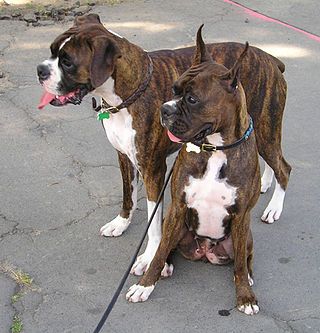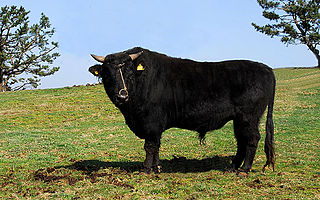The American Society for the Prevention of Cruelty to Animals (ASPCA) is a non-profit organization dedicated to preventing animal cruelty. Based in New York City since its inception in 1866, the organization's mission is "to provide effective means for the prevention of cruelty to animals throughout the United States."

Cruelty to animals, also called animal abuse, animal neglect or animal cruelty, is the infliction of suffering or harm by humans upon animals, either by omission (neglect) or by commission. More narrowly, it can be the causing of harm or suffering for specific achievements, such as killing animals for entertainment; cruelty to animals sometimes encompasses inflicting harm or suffering as an end in itself, referred to as zoosadism. Divergent approaches to laws concerning animal cruelty occur in different jurisdictions throughout the world. For example, some laws govern methods of killing animals for food, clothing, or other products, and other laws concern the keeping of animals for entertainment, education, research, or pets. There are several conceptual approaches to the issue of cruelty to animals.

Alexander Fernando Pacheco is an American animal rights activist. He is the founder of 600 Million Dogs, co-founder and former chairman of People for the Ethical Treatment of Animals (PETA) and a member of the advisory board of the Sea Shepherd Conservation Society.

A dolphinarium is an aquarium for dolphins. The dolphins are usually kept in a pool, though occasionally they may be kept in pens in the open sea, either for research or public performances. Some dolphinariums consist of one pool where dolphins perform for the public, others are part of larger parks, such as marine mammal parks, zoos or theme parks, with other animals and attractions as well.

The Animal Protection and Rescue League (APRL) is an American grassroots animal rights organization, founded in 2003, based in California's San Diego and Orange Counties.
Animal welfare and rights in Israel is about the treatment of and laws concerning nonhuman animals in Israel. Israel's major animal welfare law is the Animal Protection Law, passed in 1994, which has been amended several times since. Several other laws also related to the treatment of animals: Rabies Ordinance, 1934; Fishing Ordinance, 1937; Public Health Ordinance, 1940; Wildlife Protection Law, 1955; Plants Protection Law, 1956; Criminal Procedure Law, 1982; Animal Disease Ordinance, 1985; National Parks, Nature Reserves, National Sites and Memorial Sites Law, 1991; the Law of Veterinarians, 1991; Dog Regulation Law, 2002; Rabies Regulations (Vaccinations), 2005; and Prohibition on declawing cats unless for reasons vital to the cat's health or owner's health, 2011.
The Humane Society of the United States (HSUS) is an American nonprofit organization that focuses on animal welfare and opposes animal-related cruelties of national scope. It uses strategies that are beyond the abilities of local organizations. It works on issues including pets, wildlife, farm animals, horses and other equines, and animals used in research, testing and education. As of 2001, the group's major campaigns targeted factory farming, hunting, the fur trade, puppy mills, and wildlife abuse.

World Animal Protection, formerly The World Society for the Protection of Animals (WSPA), is an international non-profit animal welfare organization that has been in operation since 1981. The charity's mission is to create a better world for animals by protecting them.
A no-kill shelter is an animal shelter that does not kill healthy or treatable animals based on time limits or capacity, reserving euthanasia for terminally ill animals, animals suffering poor quality of life, or those considered dangerous to public safety. Some no-kill shelters will commit to not killing any animals at all, under any circumstance, except as required by law. A no-kill shelter uses many strategies to promote shelter animals; to expanding its resources using volunteers, housing and medical protocols; and to work actively to lower the number of homeless animals entering the shelter system. Up to ten percent of animals could be killed in a no-kill shelter and still be considered a no-kill shelter.

Karen Dawn is an American animal rights and welfare advocate and writer.

Street dogs, known in scientific literature as free-ranging urban dogs, are unconfined dogs that live in cities. They live virtually everywhere cities exist and the local human population allows, especially in the developing world. Street dogs may be stray dogs, pets that have strayed from or are abandoned by their owners, or maybe feral animals that have never been owned. Street dogs may be stray purebreds, true mixed-breed dogs, or unbred landraces such as the Indian pariah dog. Street dog overpopulation can cause problems for the societies in which they live, so campaigns to spay and neuter them are sometimes implemented. They tend to differ from rural free-ranging dogs in their skill sets, socialization, and ecological effects.

Society for the Protection of Animal Rights in Egypt, or S.P.A.R.E., is a non-profit animal welfare organization in Egypt. It was founded by Amina Abaza and Dina Zulfikar in 2001. It is the first animal welfare organization in Egypt to address the situation of all animals, including dogs, cats, and donkeys.

Cropping is the removal of part or all of the external flaps of an animal's ear. The procedure sometimes involves bracing and taping the remainder of the ears to train them to point upright. Almost exclusively performed on dogs, it is an old practice that was once done for perceived health, practical or cosmetic reasons. Veterinary science states there is no medical or physical advantage to the animal from the procedure, leading to concerns of animal cruelty over performing unnecessary surgery on animals. In modern times, cropping is banned in many nations, but is still legal in a limited number of countries. Where permitted, it is seen only in certain breeds of dog, such as pit bull and bull terrier type breeds, the Doberman Pinscher, Schnauzer, Great Dane, Boxer and Cane Corso.
RSPCA NSW is a not-for-profit charity operating in New South Wales, Australia that promotes animal welfare.
Animal welfare in Egypt is a neglected issue. There are only a few organizations that support the rights and wellbeing of animals.

Animal welfare in Thailand relates to the treatment of animals in fields such as agriculture, hunting, medical testing, tourism, and the domestic ownership of animals. It is distinct from animal conservation.

Animal welfare and rights in South Korea is about the laws concerning and treatment of non-human animals in South Korea. South Korea's animal welfare laws are weak by international standards. There are a handful of animal welfare and rights organizations working in South Korea, which appear to be focused largely on the welfare of companion animals and the dog meat trade.
Animal welfare and rights in Iran is about the laws concerning and treatment of non-human animals in Iran. Iran has no legislation protecting animals from cruelty.
In Italy, the Ministry of Health is responsible for animal welfare. Each province within Italy has an official appointed to the Office of Animal Rights. Their main objective is to address stray and abandoned animal issues. Italy also has passed legal protections for animals, as well as being home to several animal rights organizations.

The Turkish city of Istanbul hosts a sizeable feral cat population, with estimates ranging from a hundred thousand to over a million stray cats. Many Turkish citizens view street animals as communally owned pets rather than traditional strays, and the country has a blanket no-kill, no-capture policy.












